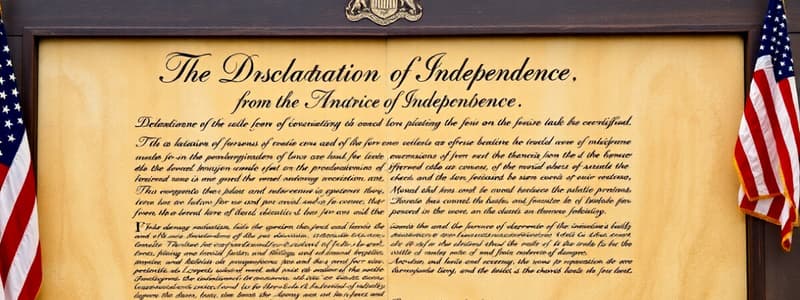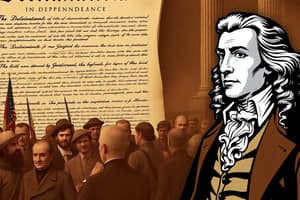Podcast
Questions and Answers
What was the significance of Richard Henry Lee's resolution presented to the Second Continental Congress?
What was the significance of Richard Henry Lee's resolution presented to the Second Continental Congress?
- It formally requested financial aid from France to support the colonial cause.
- It proposed an immediate negotiation with King George III to resolve colonial grievances.
- It outlined a new system of taxation for the colonies to fund the Continental Army.
- It declared that the united colonies should be free and independent states. (correct)
Why was Thomas Jefferson chosen to write the first draft of the Declaration of Independence?
Why was Thomas Jefferson chosen to write the first draft of the Declaration of Independence?
- He was known for his loyalty to the British Crown and ability to negotiate.
- He led the Continental Army and had earned the trust of the colonists.
- He was respected for his talents as a writer and his knowledge of government and law. (correct)
- He was the oldest and most experienced member of the Continental Congress.
In the Declaration of Independence, what are 'unalienable rights' as described by Thomas Jefferson?
In the Declaration of Independence, what are 'unalienable rights' as described by Thomas Jefferson?
- Rights that are exclusive to property owners and can be transferred with the sale of property.
- Rights that can be granted or taken away by the government based on its laws.
- Rights that are only applicable during times of peace and can be suspended during war.
- Rights that are inherent and cannot be taken away, including life, liberty, and the pursuit of happiness. (correct)
What action did colonists who supported independence take in response to the Declaration of Independence?
What action did colonists who supported independence take in response to the Declaration of Independence?
What risk did the signers of the Declaration of Independence undertake by signing the document?
What risk did the signers of the Declaration of Independence undertake by signing the document?
Why did the new states fear a strong national government after winning independence from Britain?
Why did the new states fear a strong national government after winning independence from Britain?
How did the Articles of Confederation address the fear of a strong national government?
How did the Articles of Confederation address the fear of a strong national government?
What limitation did the Articles of Confederation place on the national government's ability to manage finances?
What limitation did the Articles of Confederation place on the national government's ability to manage finances?
What was the purpose of Thomas Paine's 'Common Sense'?
What was the purpose of Thomas Paine's 'Common Sense'?
What event occurred on July 4, 1776, according to the provided information?
What event occurred on July 4, 1776, according to the provided information?
Flashcards
Independence
Independence
Freedom to govern themselves.
Resolution
Resolution
A formal statement of independence.
Declaration
Declaration
An official statement about independence.
Preamble
Preamble
Signup and view all the flashcards
Grievances
Grievances
Signup and view all the flashcards
Articles of Confederation
Articles of Confederation
Signup and view all the flashcards
John Hancock
John Hancock
Signup and view all the flashcards
Study Notes
- Colonists began to believe that issues with Britain were unresolvable.
- Thomas Paine's Common Sense influenced colonists towards self-governance.
Congress Debates
- Inspired by Paine's ideas, people from Georgia to New Hampshire advocated for independence, or self-governance.
- The Second Continental Congress in Philadelphia discussed independence.
- John Adams of Massachusetts strongly supported independence as the path to liberty for the colonies.
- On June 7, 1776, Richard Henry Lee of Virginia proposed that the 13 colonies should no longer pledge loyalty to the king.
- Lee called for a resolution for a formal group statement.
- The resolution stated: "Resolved: That these united colonies are, and of right ought to be, free and independent states."
Declaration Writing
- Congress debated Lee's resolution and formed a committee to write a declaration, an official statement about independence for the king.
- Thomas Jefferson of Virginia, a 33-year-old lawyer, was asked to write the first draft, aided by his knowledge of law and government.
- Jefferson was the main author, but other committee members contributed ideas.
- He spent about 17 days writing and revising the Declaration of Independence.
Independence Declaration
- Thomas Jefferson carefully planned the Declaration of Independence.
- The preamble explained the necessity of the Declaration.
- It stated the colonies' right to separate from Britain.
- The next part describes the colonists' core beliefs about government.
- It declared the rights to life, liberty, and the pursuit of happiness which governments cannot take away.
- The longest part of the Declaration lists the colonists' grievances, or complaints, against King George III and Parliament.
- It also mentions the colonists' attempts to resolve issues with Britain peacefully.
- The Declaration concludes with the statement that the colonies were free and independent.
Approving the Declaration
- After completing the draft, Thomas Jefferson submitted the Declaration of Independence to Congress.
- On June 28, Congress read it aloud to the delegates.
- On July 2, the delegates voted in favor of Richard Henry Lee's resolution to sever ties with Britain, and the colonies considered themselves independent states.
- On July 4, 1776, Congress adopted the final wording of the Declaration.
- Four days later, on July 8, large crowds gathered outside the Pennsylvania State House, later known as Independence Hall, for the first public reading by Colonel John Nixon.
- News spread, leading supporters to tear down symbols of King George III and celebrate with songs, bells, and cannons.
- John Adams rejoiced in these celebrations and foresaw Independence Day being celebrated "by succeeding generations... from this time forward."
A Dangerous Choice
- On August 2, the Declaration was ready for signing by the members of the Second Continental Congress.
- John Hancock, Congress's president, was the first to sign, writing his name large so King George III could read it, thereby popularizing "John Hancock" as a synonym for "signature."
- Signing was perilous as King George III vowed against the rebellion, thus losing would mean the signers faced treason charges, punishable by death.
- Benjamin Franklin joked, "We must all hang together, or… we shall all hang separately," stressing the need for unity against the British.
Importance Declared
- In 1776, only white men with property could vote.
- Abigail Adams advocated for women's rights to be recognized by Congress.
- Full realization of the Declaration's promise would take years for women, African Americans, and Native Americans.
- The Declaration has inspired movements worldwide for freedom and equal rights.
Forming Government
- The Second Continental Congress formed another committee to unite the 13 states.
- John Dickinson was chosen to lead the committee to unite the 13 states.
- Each of the 13 states would govern itself, but collaborate on national matters.
- The Articles of Confederation, the first government plan for the United States, marked a shift from being ruled by a king.
Articles Explained
- The Articles of Confederation were approved by Congress in 1777 and the states later.
- Under the Articles, each state chose representatives for a national legislature which was called the Confederation Congress.
- Each state had one vote in Congress, regardless of size.
- Until 1789, this Congress made laws for the new nation and helped maintain unity during the Revolutionary War.
- The Articles had weaknesses that caused problems for the new government.
Deficiencies Noted
- Americans feared a strong central government due to their fight for independence so, the Articles of Confederation gave more power to the states.
- Laws required approval from representatives of at least 9 of the 13 states which were rare.
- States were unwilling to cede control to other states.
- Congress lacked the power to enforce approved laws.
- The Articles limited the national government's powers like controlling trade or levying taxes, while permitting it to declare war, make treaties, and borrow money.
- To cover war debts and other expenses, Congress relied on states for money but could not compel them to pay.
- The Articles made Congress dependent on the states for national defense; Congress could request an army, but the states had to supply the soldiers.
Summary Points
- Colonists called for independence due to Thomas Paine's Common Sense.
- Thomas Jefferson was tasked with writing the Declaration of Independence.
- Congress later adopted the Articles of Confederation, the first government plan.
Studying That Suits You
Use AI to generate personalized quizzes and flashcards to suit your learning preferences.




